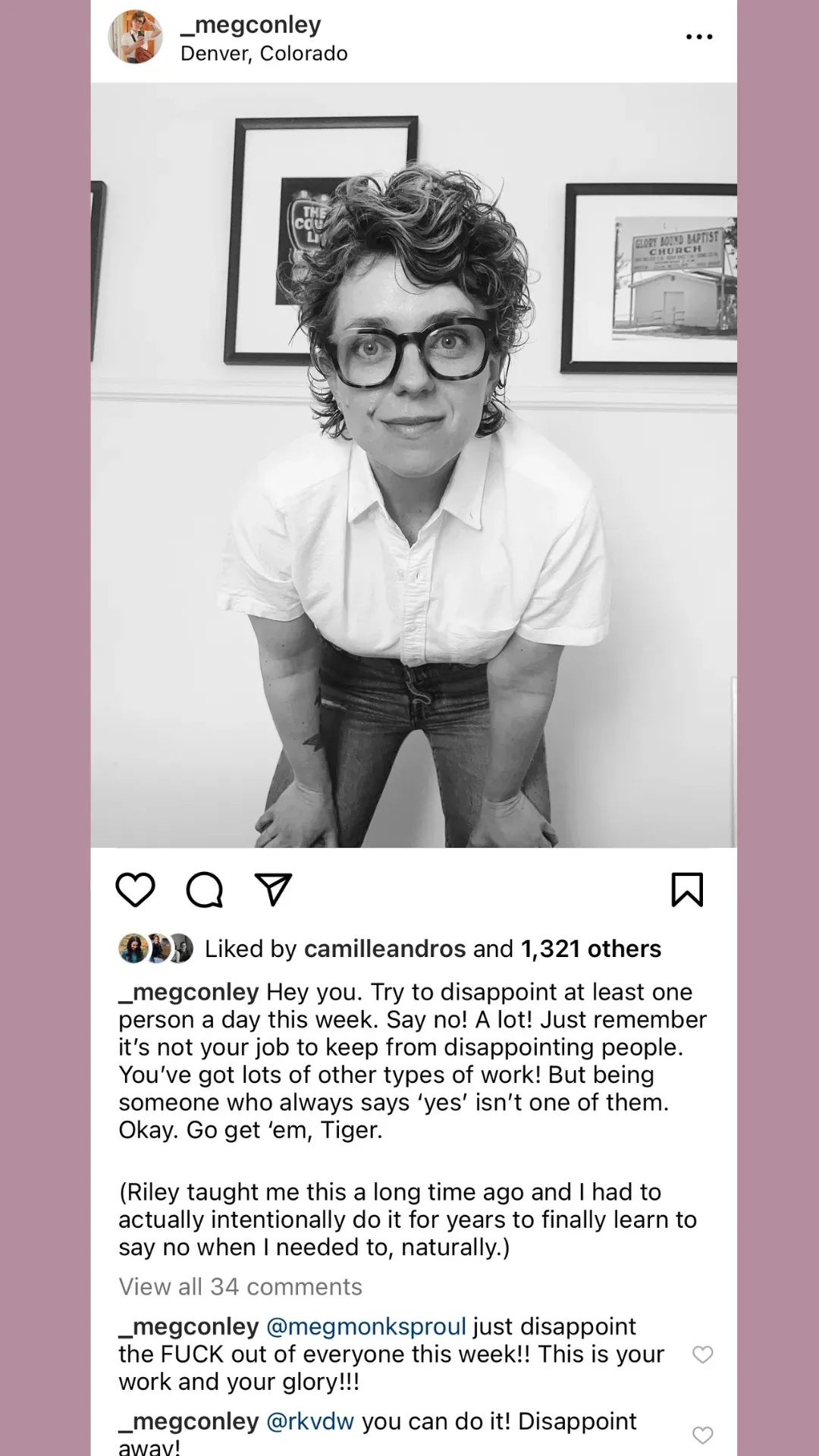Yesterday, I posted a little thing to Instagram. And yeah, I am trying to use my face more in my communication with the world. And indeed, that kind of makes me want to melt like the Wicked Witch of the West. Anyways. This is me in one of Riley’s shirts sharing a lesson I learned from him.
“Hey you. Try to disappoint at least one person a day this week. Say no! A lot! Just remember, it’s not your job to keep from disappointing people. You’ve got lots of other types of work! But being someone who always says yes isn’t one of them. Okay. Go get ‘em, Tiger.”
Women responded with the things they’re having a hard time saying no to this week - family dinners, old boyfriends, employer demands and, in one case, an unnecessary surgery. (She was being pressured by a doctor who didn’t want to cancel it because he’d already booked the time slot. CAN YOU BELIEVE.) I am still reading through all the DMs. I guess this is something a lot of us need to work on.
Riley really did teach me how to disappoint people. Which sounds like a burn, but it’s really praise. Let me explain.
Scroll past my face (PLEASE, OH MY GOSH) for the rest of the newsletter. Ahem.

A few months after we had our first daughter, he started going out of his way to disappoint people. Like, he had a disappointed people quota he had to fill - two a week! I thought he was bonkers. And told him so, many times. But he wasn’t. He was just overwhelmed.
He was 24 years old. In college. Working full-time. Trying to pay for housing, food and healthcare. And figuring out how to be a brand new parent. (I was all those things too. Except for college, but plus postpartum depression. Winner winner chicken dinner.)
Riley shows up for people. He’s the type of person who says yes if he’s asked to work harder, longer or later. But as his life filled up with obligations, saying yes sometimes meant saying no to things that really mattered to him. Things like being at home with his depressed wife who couldn’t stop staring at walls and his baby girl who couldn’t stop staring at him. So he had to teach himself to say no to people at work, church and school.
He’d realized it wasn’t the no that was hard for him. Instead, it was a person’s disappointment when he said no that he found difficult. So, like he does, he framed the problem clearly and then went about solving it very, very intentionally.
He said no to professors, colleagues and family members. When he told church leaders he wouldn’t attend more than one administrative meeting a week, I felt uncomfortable. Shouldn’t the church come first? (He said no.)
One night, after a long day of school and a late night shift at work, Riley came home, picked up our baby girl and proudly whispered to her,
“I disappointed three people this week instead of two!”
It’s very sweet. But it’s also a little sad. We were trying so hard. I wish I could hug us both, tell us we were going to be okay.
Looking back, the timing of his experiment in disappointment is kind of profound. He realized he’d have to get used to disappointing people right after our daughter was born. He was beginning to reject a piece of our shared religious and political culture, the idea that a man had work in the church and market that he should prioritize over his work in the home.
I can trace a direct line from that 24 year old boy learning to disappoint church leaders to the 36 year old man who finally said, “We can’t keep raising our girls in a church that doesn’t value them.” One no leads to another, I guess. 1
I did finally start teaching myself to disappoint people.
I’ve never been quite as regimented as Riley.2 So there were no quotas. And it was a hard lesson for me for slightly different reasons. He was giving up access to power in church and the office when he said no. I didn’t really have that access to give up in the first place.
Instead, I’d absorbed the idea that my work and worth as a woman was tied to the way people felt about me. If someone felt disappointed in me, I hadn’t done my work and I wasn’t living up to my worth. That’s hogwash, of course. But I’ve believed lots of nonsense in my 38 years. It took me awhile to unbelieve it.
I want to be super clear here. Learning to say no is not an excuse to not do. I always try to do what I can, when I can, even if its hard or makes me uncomfortable. But when I can’t, or shouldn’t, I’ve gotten better at saying so.
Something that helps me? When I remember sometimes no is a yes to something else. Like, this week I said No to an underpaid commission in a national publication. That was an incredibly difficult no. But it means yes to more writing here for you. And that’s an easy yes.
1 Riley and I both learned how to say no to each other too. So when he started talking about leaving the Mormon church, I didn’t say yes because I thought it was my job to keep from disappointing him. I said yes because I meant it.
2 understatement of the damn century

